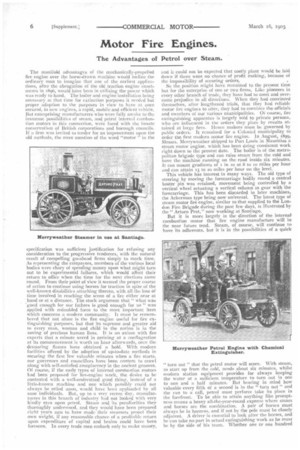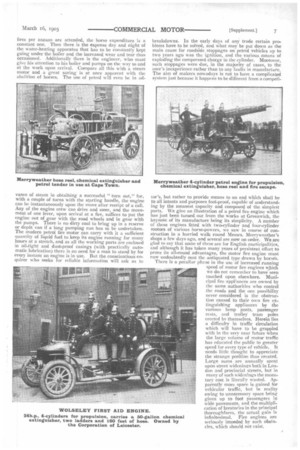Motor Fire Engines.
Page 6

Page 7

If you've noticed an error in this article please click here to report it so we can fix it.
The Advantages of Petrol over Steam.
The manifold advantages of the mechanically-propelled fire engine over the horse-drawn machine would incline the ordinary man to imagine that one of the earliest applications, after the abrogation of the old traction engine enactments in 1896, would have been in utilising the power which was ready to hand. The boiler and engine installation being necessary at that time for extinction purposes it needed but proper adaption to the purposes in view to have at once secured, in new engines, a rapid, mobile and efficient vehicle. But enterprising manufacturers who were fully awake to the immense possibilities of steam, and petrol internal combustion motors in this connection, were faced with the innate conservatism of British corporations and borough councils. If a firm was invited to tender for an improvement upon the old methods, the mere mention of the word "motor " in the specification was sufficient justification for refusing any consideration to the progressive tenderers, with the natural result of compelling go-ahead firms simply to mark time. As representing the ratepayers, members of the various local bodies were chary of spending money upon what might turn out to be experimental failures, which would affect their return to office when the time for the next elections came round. From their point of view it seemed the proper course of action to continue using horses for traction in spite of the well-known disabilities attaching thereto, with all the loss of time involved in reaching the scene of a fire either near at hand or at a distance. The stock argument that "what was 'good enough for our fathers is good enough for us " was applied with redoubled force to the most important item which concerns a modern community. It must be remembered that not alone is the fire engine useful for tire extinguishing purposes, but that its supreme and greater aid to every man, woman and child in the nation is in the saving of precious human lives. It is an axiom with fire experts that a minute saved in arriving at a conflagration at its commencetnent is worth an hour afterwards, once the devouring flames have obtained a hold. With modern facilities offered by the adoption of up-to-date methods in securing the first few valuable minutes when a fire starts, our governors and councillors have been content to crawl along with self-satisfied complacency in the ancient grooves. Of course, if the early types of internal combustion motors had been proposed for fire-engine work, the desire to be contented with a well-understood good thing, instead of it little-known machine and one which possibly could not always be relied upon, would have been applauded by all sane individuals. But, up to a very recent day, manufacturers in this branch of industry had not looked with very kindly eves upon petrol. Steam and its peculiarities they thoroughly understood, and they would have been prepared eight years ago to have made their steamers propel their own weight, if any reasonable chance of a profitable return upon expenditure of capital and brains could have been foreseen. In every trade men embark only to mahe money,
and it could not be expected that costly plant would be laid down if there were no chance of profit making, because of the impossibility of securing orders.
So the position might have remained to the present time but for the enterprise of one or two firms. Like pioneers in every other branch of trade, they have had to meet and overcome prejudice in all directions. When they had convinced themselves, after lengthened trials, that they had reliable motor fire engines to oiler, they had to convince the officials and members of our various municipalities. 01 course, tire extinguishing apparatus is largely sold to private persons, who are influenced in the orders they place by results attained at large fires. Hence makers must be governed by public orders. It remained for a Colonial municipality to order the first modern motor fire engine. In August, 1899, Messrs. Merryweather shipped to Port Louis in Mauritius a steam motor engine, which has been doing consistent work right down to the present date. The boiler is of the metropolitan brigade type and can raise steam from the cold and have the machine running on the road inside six minutes. It can mount gradients of i in io at 8 to to miles per hour and can attain le to 20 miles per hour on the level. This vehicle has interest in many ways. The old type of steering by moving the forecarriage bodily round a central boster pin was retained, movement being controlled by a vertical wheel actuating a vertical column in gear with the forecarriage. This has been discarded in later machines, the Ackerman type being now universal. The latest type of steam motor fire engine, similar to that supplied to the London Fire Brigade during the past few days, is illustrated by the " Arturo Prat," now working at Santiago. But it is more largely in the direction of the internal. combustion motor that fire engine manufacture will in the near future tend. Steam, of course, will continue to have its adherents, but it is in the possibilities of a quick "turn out " that the petrol motor will score. With steam, to start up from the cold, needs about six minutes, whilst modern station equipment provides for always keeping the water at a sufficient temperature to turn out in one to one and a half minutes. But bearing in mind how valuable every fifth of a second is in the "turn out" and the run to a call, petrol must perforce take its place in the forefront. To be able to attain anything like promptness means a heavy all-the-year-round expense where steam and horses are the combination. A pair of horses must always be in harness, and if not by the pole must be closely adjacent. A driver is essential to look after the horses, and he can take no part in actual extinguishing work as he must be by the side of his team. Whether one or one hundred fires per annum are attended, the horse expenditure is a constant one. Then there is the expense day and night of the water-heating apparatus that has to be constantly kept going under the boiler and the increased wear and tear thus occasioned. Additionally there is the engineer, who must give his attention to his boiler and pumps on the way to and at the work upon arrival. Compare all this with a steam motor and a great saving. is at once apparent with the abolition of horses. The use of petrol will even be in ad
vance of steam in obtaining a successful "turn out," for, with a couple of turns with the starting handle, the engine can be instantaneously upon the move after receipt of a call. Any of the engine crew can drive and steer, and the movement of one lever, upon arrival at a fire, suffices to put the engine out of gear with the road wheels and in gear with the pumps. There is no dirty coal to bring up in a reserve or depot van if a long pumping run has to be undertaken. The modern petrol fire motor can carry with it a sufficient quantity of liquid fuel to keep its engine running for many hours at a stretch, and as all the working parts are enclosed in oil-tight and dust-proof casings (with practically automatic lubrication) there is no need for a man to stand by for every instant an engine is in use. But the conscientious enquirer who seeks for reliable information will ask as to
breakdowns. In the early days of any trade certain pro. blerns have to be solved, and what may be put down as the main cause for roadside stoppages on petrol vehicles up to two years ago was the ignition, and the various means of exploding the compressed charge in the cylinder. Moreover, such stoppages were due, in the majority of cases, to the user's inexperience rather than to any faults in manufacture. The aim of makers nowadays is not to have a complicated system just because it happens to be different from a competi tor's, but rather to provide means to an end which shall be to all intents and purposes fool-proof, capable of understanding by the meanest capacity and composed of the simplest parts. We give an illustration of a petrol fire engine which has just been turned out from the works at Greenwich, the keynote of its manufacture being its simplicity. A number of these engines fitted with two-cylinder and four-cylinder motors of various horse-powers, we saw in course of construction in a hurried walk round Messrs. Merrvweather's shops a few days ago, and several are now on order. We are glad to say that some of these are for English municipalities, and although it has taken many years of persistent effort to prove its all-round advantages, the motor fire engine must now undoubtedly oust the antiquated type drawn by horse's. There is a peculiar phase in the use of increased running speed of motor fire engines which we do not remember to have seen touched upon elsewhere. Municipal fire appliances are owned by the same authorities who control the roads and the one possibility never considered is the obstruction caused to their own fire extinguishing appliances by the various lamp posts, passenger rests, and trolley tram poles erected by themselves. Herein lies a difficulty in traffic circulation which will have to be grappled with in the very near future when the large volume of motor traffic has educated the public to greater speed for every type of vehicle. It needs little thought to appreciate the strange position thus created. Large sums are annually spent upon street widenings both in London and provincial streets, but in many of such widcnings the monetary cost is literally wasted. Apparently more space is gained for vehicular traffic, but in reality owing to unnecessary space being given up to foot passengers in wide pavements, and the multiplication of lavatories in the principal thoroughfares, the actual gain is infinitesimal. Fire engines are seriously impeded by such obstacles, which should not exist.
























